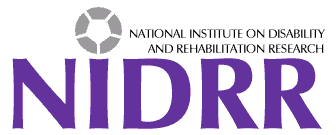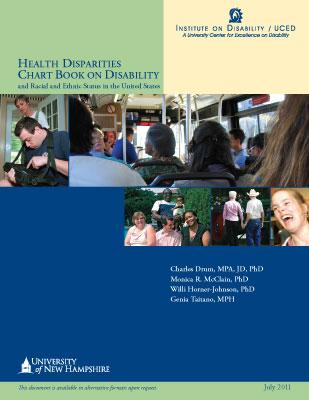A growing body of research has documented that persons with disabilities are more likely to experience health disparities compared to the general population. The Disability and Rehabilitation Research Project: Health and Health Care Disparities Among Individuals with Disabilities project will extend this research by determining what factors relate to or explain health outcomes and health care access among the diverse populations of individuals with disabilities.
The goal of the Health Disparities Project is to generate new knowledge about health access and health outcomes among sub-groups of people with disabilities and translate and disseminate the findings for researchers, policy makers, and others.
The project will have four major components:
- A review and synthesis of existing research on health and health care access among individuals with disabilities and subgroups of individuals with disabilities. The project will use this review to inform the subsequent research activities of the project.
- Two series of structural equation modeling studies using the National Health Interview Survey dataset linked to Medical Expenditure Panel Survey data. The first series of studies will determine models of systems level, environmental level, and individual level factors that relate to health care access among persons with a range of disabilities. The second series of studies will extend these analyses to determine models of health outcomes for persons with a range of disabilities. Formulation of the studies and subsequent interpretation of their findings will be informed by member-check validation studies at the initiation of the project, mid-point and in final interpretation.
- Translation of research findings to impact future research, and programs and policy development. In addition to other dissemination activities, a Policy Forum will be conducted in Washington, DC, to facilitate discussion regarding research, program, and policy implications.
Completion of this integrated set of project activities will ensure that the field of health disparities research advances beyond documentation to explanation and opportunity for resolution.

The Health and Health Care Disparities Among Individuals with Disabilities Project (Health Disparities Project) is funded under a grant from the U.S. Department of Education, National Institute for Disability and Rehabilitation Research (NIDRR), grant H133A100031. The contents do not necessarily represent the policy of the U.S. Department of Education and you should not assume endorsement by the Federal Government.
Health Disparities Chart Book

The purpose of the Health Disparities Chart Book on Disability and Racial and Ethnic Status in the United States is to answer the question of whether working age (18-64) people with disabilities in the United States experience health disparities similar to those experienced by members of racial and ethnic minority groups in the United States. Because of the perception that disability is solely an aging phenomenon, we limited our analysis to people of working age. Relatively little research has been conducted comparing the health of people with disabilities to that of people from racial and ethnic minority groups. However, research has consistently documented that, as a group, people with disabilities experience worse health than the general population. Specifically, people with a variety of physical and cognitive disabilities are more likely to experience poorer health status, potentially preventable secondary conditions, chronic conditions, and early deaths. The report is based on a presentation requested by the Interagency Committee on Disability Research (ICDR) in 2010.
Download a PDF copy of the Chart Book
Partners
The development of the Health Disparities Chart Book on Disability and Racial and Ethnic Status in the United States was a collaboration among:
- Charles Drum, MPA, JD, Ph.D. – Institute on Disability, University of New Hampshire
- Monica R. McClain, Ph.D. – Institute on Disability, University of New Hampshire
- Willi Horner-Johnson, Ph.D. - Center on Community Accessibility, Oregon Health & Science University
- Genia Taitano, MPH - Center on Community Accessibility, Oregon Health & Science University
The report was supported in part by the Disability and Rehabilitation Research Project: Health and Health Care Disparities Among Individuals with Disabilities Project (Health Disparities Project), Grant/Cooperative Agreement Number H133A100031, from the National Institute on Disability and Rehabilitation Research (NIDRR), United States Department of Education. The Health Disparities Project is located at the University of New Hampshire, with collaborators at Oregon Health & Science University, and the University of Missouri at Kansas City.
Other Dissemination Materials
Presentations
Disability and Public Health: Five Years Later
Presented by: Charles E. Drum, MPA, JD, PhD
May, 2014
Download Presentation
Disability as a Health Disparity Minority Group
Presented by: Kimberly Phillips, MA & Charles E. Drum, MPA, JD, PhD
October, 2013
Download Presentation
What in the Health is Disability Doing in Public Health? Re-Thinking Disability in Public Health
Presented by: Charles E. Drum, MPA, JD, PhD
October, 2013
Download Presentation
Disability & Health: Definitions, Determinants, & Disparities
Presented by: Charles E. Drum, MPA, JD, PhD & Kimberly Phillips, MA
August, 2013
Download Presentation
Understanding Health Disparities among People with Disabilities: Core Health Indicators
Presented by: Michael H. Fox, Sc.D. & Kimberly Phillips, MA
November, 2012
Download Presentation
Understanding Health Disparities among People with Disabilities: Core Health Indicators was co-presented by Michael H. Fox from the U.S. Centers for Disease Control and Prevention (CDC) and Kimberly Phillips of the UNH Institute on Disability (IOD) on November 13, 2012, at the Knowledge 4 Equity Conference in Silver Spring, MD. The key points of the talk focused on gaps experienced by people with disabilities, compared to people without disabilities, on leading indicators of health and described CDC-funded programs that work to reduce these gaps and improve the health of people with disabilities.
Disability and Racial & Ethnic Status in the US: Determinants, Disparities & Health Equity
Presented by: Charles E. Drum, MPA, JD, PhD & Kimberly Phillips, MA
October, 2012
Download Presentation
Health Briefs
The Disability and Rehabilitation Research Project: Health and Health Care Disparities Among Individuals with Disabilities examines differences in health outcomes and health care access among diverse populations of people with disabilities. Periodically, it produces Health Briefs highlighting recent publications and research.
-
A Summary of “Pap, mammography, and clinical breast examination screening among women with disabilities: A systematic review” by Elena M. Andresen, Jana J. Peterson-Besse, Gloria L. Krahn, Emily S. Walsh, Willi Horner-Johnson, and Lisa I. Iezzoni. Written by Michelle Stransky, Ph.D.
This brief reviews the findings of Andresen et al. (2013), who examine the impact of disability severity on cancer screenings for women. This is the first in a series of health briefs translating peer-reviewed published research articles into everyday language for the general public.
-
A Summary of “Searching for disability in electronic databases of published literature” by Emily S. Walsh, Jana J. Peterson, Dolores Z. Judkins, and The Expert Panel on Health Care Disparities Among Individuals with Disabilities. (2014). Published in Disability and Health Journal, 7(1), 114-118. Written by Michelle Stransky, Ph.D.
This brief reviews the work of Walsh et al. (2014), who develop and describe a strategy for researching disability in published literature. This is the second in a series of health briefs translating peer-reviewed published research articles into everyday language for the general public.
-
A Summary of “Clinical Preventive Service Use Disparities among Subgroups of People with Disabilities: A Scoping Review” by Jana J. Peterson-Besse, Megan S. O’Brien, Emily S. Walsh, Amalia Monroe-Gulick, Glen White, Charles E. Drum, and the Expert Panel on Health Disparities among Individuals with Disabilities. Published in Disability and Health Journal, Article Available Online Before Print. Written by Michelle Stransky, Ph.D.
This brief reviews the findings of Peterson-Besse et al. (Online before Print), who review the use of clinical preventive services among subgroups of people with disabilities. This is the third in a series of health briefs translating peer-reviewed published research articles into everyday language for the general public.
Posters
Differences in Physical and Mental Health Status for People with Different Types of Disabilities
Presented by: Konrad Dobbertin, MPH; Willi Horner-Johnson, PhD; Jae Chul Lee, PhD; the Expert Panel on Disability and Health Disparities; Institute on Development and Disability, Oregon Health & Science University; National Institutes of Health, Mark O. Hatfield Research Center
Download Poster
Disparity in Access to a Usual Source of Medical Care among Working-Age Adults with Disabilities in the United States
Presented by: Jae Chul Lee PhD; Willi Horner-Johnson PhD; Charles E. Drum, JD, PhD; Oregon Institute on Disability and Development; Oregon Health & Science University Institute on Disability; University of New Hampshire
Download Poster
Publications
- Andresen, E.M., Peterson-Besse, J.J., Krahn, G.L., Walsh, E.S., Horner-Johnson ,W., & Iezzoni, L.I. (2013). Pap, mammography, and clinical breast examination screening among women with disabilities: A systematic review. Women’s Health Issues, 23(4), e205-e214.
- Horner-Johnson, W., Dobberton, K., Lee, J.C., Andresen, E., & the Expert Panel on Disability and Health Disparities [C. Drum, G. Fujiura, G. Krahn, & L. Iezzoni]. (2013). Disparities in chronic conditions and health status by type of disability. Disability and Health Journal, 6 (4), 287-296.
- Walsh, E., Peterson, J., Judkins, D. & the Expert Panel on Disability and Health Disparities [C. Drum, G. Fujiura, G. Krahn, & L. Iezzoni]. (2014) Searching for disability in electronic databases of published literature. Disability and Health Journal, 7 (1), 114-118.
- Rowland, M., Peterson-Besse, J., Dobbertin, K., Walsh, E, Horner-Johnson, W. & the Expert panel on Disability and Health Disparities [C. Drum, G. Fujiura, G. Krahn, & L. Iezzoni]. (2014) Health outcome disparities among subgroups of people with disabilities: A scoping review. Disability and Health Journal, 7, 136 - 150.
- Dobbertin K, Horner-Johnson W, Lee JC, Andresen EM, Subgroup Differences in Having a Usual Source of Healthcare among Working-Age Adults with and without Disabilities, Disability and Health Journal (2014), doi: 10.1016/j.dhjo.2014.08.012.
- Horner-Johnson W, Dobbertin K, Lee JC, Andresen EM, Rural disparities in receipt of colorectal cancer screening among adults ages 50–64 with disabilities, Disability and Health Journal (2014),7 (4), 394-401
Past Expert Panel Members
The project was assisted by a national expert panel that included:
- Lisa Iezzoni, MD (Harvard University / Massachusetts General Hospital
- Glenn Fujiura, PhD (University of Illinois at Chicago)
- Jana Peterson, MPH, PhD (Pacific University)
- Gloria Krahn, PhD, MPH (Centers for Disease Control and Prevention / National Center on Birth Defects and Developmental Disabilities)
- Key project staff from IOD
In addition, the American Association on Health and Disability assisted in disseminating project results.